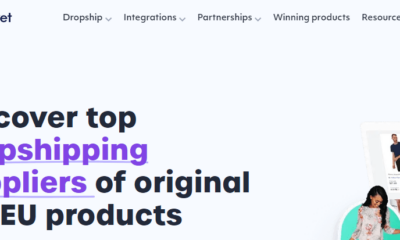TECHNOLOGY
Featured Payment Solutions To Help Grow Your Small Business

Are you trying to find strategies for your small company to expand?
There are several excellent payment options available that might assist you in expanding your company.
The greatest payment options for small companies will be examined in this post, along with an explanation of how each one might assist you in expanding your company. We’ll also provide some advice on how to choose the best payment option for your company.
Therefore, these payment methods may help you grow your company, whether you’re just starting or have been in operation for a long time.
Which Common Payment Options Are Available to Small Businesses?

There are different ways for online payments available, but which is best for your small business? Here are a few of the most typical:
What Advantages Come With the Use of a Payment Solution?
Using a payment system for your small company has several advantages.
To begin with, it may assist you in managing your financial flow. You won’t have to worry about late fines or missing payments, and you can eliminate the stress of keeping track of payments and invoices.
Additionally, a payment solution might aid in company growth. It simplifies the procedure and makes it simple to take payments from clients all around the globe, allowing you to concentrate on what you do best—running your company.
Also, implementing a payment solution is a terrific method to increase client confidence. They may be certain that their transactions will go successfully since they are aware that their information is safe and secure.
What Should I Take Into Account When Selecting a Payment Solution?
There are a few considerations you should make when selecting a payment system for your small company.
-
Cost: What will the monthly cost of the payment arrangement be? How much are the setup costs?
-
Usability: How simple is it to use? Is it possible to accept payments directly via your website, or should a third party be involved?
-
Practicality: How practical is it for your clients? Do they have to write a check to pay or may they use their credit card?
-
Time required for payment processing: How soon will payments be handled and paid to your account?
-
Customer support What type of support is provided by the payment method? Are there any unstated costs? How simple is it to contact someone when you have a question or issue?
What Contributes to the Growth of Your Small Business?
Your small company may expand in several ways with the aid of a payment system. First off, it could make it simpler for them to pay you. This is crucial if you run an internet company where customers may not have the time to mail a check or use a credit card.
Second, a payment solution might assist you in better managing your money. As a result, you’ll be better able to understand your income and where it comes from. Any small company owner who wants to keep track of their spending and ensure they’re making a profit has to do this.
You may expedite the payment processing by using a payment solution. If you want to be paid promptly so you can put the money back into your company, this is crucial. And lastly, by making it simple for your consumers to pay you, a payment solution may help you forge better bonds with them.
What Are a Few Regular Payment Problems That Small Businesses Run Into?

Small companies often deal with a few recurring problems when it comes to accepting payments.
First, there is the difficulty of selecting the best supplier of payment solutions. It might be challenging to decide which solution is the greatest match for your company given the variety of possibilities available.
The issue of security is another. Small companies must ensure that their payment information is secure and shielded from hackers and online criminal activity.
The problem of conformity is the ultimate one. It may be challenging to stay on top of all the most recent updates and changes to the laws that apply to payments for all firms.
Conclusion
You understand as a small business owner how critical it is to stay current with payment technology to advance your company. It’s likely going to be up to you to figure out which payment options are most suitable for your company, although banks make it their mission to act as payment solution facilitators and make an effort to cater to the requirements of proprietors of small businesses.
-
Credit cards: Because of their convenience and ease of use, credit cards are one of the most widely used payment options. Additionally, they provide a variety of advantages including reward points and trip miles.
-
Square: Due to its simplicity of use and lack of monthly fees, Square is a well-liked payment option for small enterprises. Additionally, it provides a variety of services, including inventory management, reporting, and invoicing.
-
Authorize.net, which is a solution offered by Visa: This indicates that its primary goal is to ensure that online merchants and enterprises may safely accept payments made by credit card and electronic check using websites dedicated to online commerce. Authorize.net has been a back-end payments processor for a considerable amount of time, and they have the client list to show it. Even though this company is not well-known, they have been successful.
-
Shopify for payments: Those interested in running an online store may take advantage of the all-in-one platform offered by this service, which includes catalog and shopping card services in addition to an integrated payment processing solution known as Shopify Payments. Shopify Payments is the back-end payment processing engine that will be used by customers of Shopify’s website service as well as users of Shopify POS, Shopify’s distinct point-of-sale solution.
Pick the one that best meets your demands from among these payment options, since each one has a variety of helpful features.
Source link
TECHNOLOGY
Next-gen chips, Amazon Q, and speedy S3

AWS re:Invent, which has been taking place from November 27 and runs to December 1, has had its usual plethora of announcements: a total of 21 at time of print.
Perhaps not surprisingly, given the huge potential impact of generative AI – ChatGPT officially turns one year old today – a lot of focus has been on the AI side for AWS’ announcements, including a major partnership inked with NVIDIA across infrastructure, software, and services.
Yet there has been plenty more announced at the Las Vegas jamboree besides. Here, CloudTech rounds up the best of the rest:
Next-generation chips
This was the other major AI-focused announcement at re:Invent: the launch of two new chips, AWS Graviton4 and AWS Trainium2, for training and running AI and machine learning (ML) models, among other customer workloads. Graviton4 shapes up against its predecessor with 30% better compute performance, 50% more cores and 75% more memory bandwidth, while Trainium2 delivers up to four times faster training than before and will be able to be deployed in EC2 UltraClusters of up to 100,000 chips.
The EC2 UltraClusters are designed to ‘deliver the highest performance, most energy efficient AI model training infrastructure in the cloud’, as AWS puts it. With it, customers will be able to train large language models in ‘a fraction of the time’, as well as double energy efficiency.
As ever, AWS offers customers who are already utilising these tools. Databricks, Epic and SAP are among the companies cited as using the new AWS-designed chips.
Zero-ETL integrations
AWS announced new Amazon Aurora PostgreSQL, Amazon DynamoDB, and Amazon Relational Database Services (Amazon RDS) for MySQL integrations with Amazon Redshift, AWS’ cloud data warehouse. The zero-ETL integrations – eliminating the need to build ETL (extract, transform, load) data pipelines – make it easier to connect and analyse transactional data across various relational and non-relational databases in Amazon Redshift.
A simple example of how zero-ETL functions can be seen is in a hypothetical company which stores transactional data – time of transaction, items bought, where the transaction occurred – in a relational database, but use another analytics tool to analyse data in a non-relational database. To connect it all up, companies would previously have to construct ETL data pipelines which are a time and money sink.
The latest integrations “build on AWS’s zero-ETL foundation… so customers can quickly and easily connect all of their data, no matter where it lives,” the company said.
Amazon S3 Express One Zone
AWS announced the general availability of Amazon S3 Express One Zone, a new storage class purpose-built for customers’ most frequently-accessed data. Data access speed is up to 10 times faster and request costs up to 50% lower than standard S3. Companies can also opt to collocate their Amazon S3 Express One Zone data in the same availability zone as their compute resources.
Companies and partners who are using Amazon S3 Express One Zone include ChaosSearch, Cloudera, and Pinterest.
Amazon Q
A new product, and an interesting pivot, again with generative AI at its core. Amazon Q was announced as a ‘new type of generative AI-powered assistant’ which can be tailored to a customer’s business. “Customers can get fast, relevant answers to pressing questions, generate content, and take actions – all informed by a customer’s information repositories, code, and enterprise systems,” AWS added. The service also can assist companies building on AWS, as well as companies using AWS applications for business intelligence, contact centres, and supply chain management.
Customers cited as early adopters include Accenture, BMW and Wunderkind.
Want to learn more about cybersecurity and the cloud from industry leaders? Check out Cyber Security & Cloud Expo taking place in Amsterdam, California, and London. Explore other upcoming enterprise technology events and webinars powered by TechForge here.
TECHNOLOGY
HCLTech and Cisco create collaborative hybrid workplaces

Digital comms specialist Cisco and global tech firm HCLTech have teamed up to launch Meeting-Rooms-as-a-Service (MRaaS).
Available on a subscription model, this solution modernises legacy meeting rooms and enables users to join meetings from any meeting solution provider using Webex devices.
The MRaaS solution helps enterprises simplify the design, implementation and maintenance of integrated meeting rooms, enabling seamless collaboration for their globally distributed hybrid workforces.
Rakshit Ghura, senior VP and Global head of digital workplace services, HCLTech, said: “MRaaS combines our consulting and managed services expertise with Cisco’s proficiency in Webex devices to change the way employees conceptualise, organise and interact in a collaborative environment for a modern hybrid work model.
“The common vision of our partnership is to elevate the collaboration experience at work and drive productivity through modern meeting rooms.”
Alexandra Zagury, VP of partner managed and as-a-Service Sales at Cisco, said: “Our partnership with HCLTech helps our clients transform their offices through cost-effective managed services that support the ongoing evolution of workspaces.
“As we reimagine the modern office, we are making it easier to support collaboration and productivity among workers, whether they are in the office or elsewhere.”
Cisco’s Webex collaboration devices harness the power of artificial intelligence to offer intuitive, seamless collaboration experiences, enabling meeting rooms with smart features such as meeting zones, intelligent people framing, optimised attendee audio and background noise removal, among others.
Want to learn more about cybersecurity and the cloud from industry leaders? Check out Cyber Security & Cloud Expo taking place in Amsterdam, California, and London. Explore other upcoming enterprise technology events and webinars powered by TechForge here.
TECHNOLOGY
Canonical releases low-touch private cloud MicroCloud

Canonical has announced the general availability of MicroCloud, a low-touch, open source cloud solution. MicroCloud is part of Canonical’s growing cloud infrastructure portfolio.
It is purpose-built for scalable clusters and edge deployments for all types of enterprises. It is designed with simplicity, security and automation in mind, minimising the time and effort to both deploy and maintain it. Conveniently, enterprise support for MicroCloud is offered as part of Canonical’s Ubuntu Pro subscription, with several support tiers available, and priced per node.
MicroClouds are optimised for repeatable and reliable remote deployments. A single command initiates the orchestration and clustering of various components with minimal involvement by the user, resulting in a fully functional cloud within minutes. This simplified deployment process significantly reduces the barrier to entry, putting a production-grade cloud at everyone’s fingertips.
Juan Manuel Ventura, head of architectures & technologies at Spindox, said: “Cloud computing is not only about technology, it’s the beating heart of any modern industrial transformation, driving agility and innovation. Our mission is to provide our customers with the most effective ways to innovate and bring value; having a complexity-free cloud infrastructure is one important piece of that puzzle. With MicroCloud, the focus shifts away from struggling with cloud operations to solving real business challenges” says
In addition to seamless deployment, MicroCloud prioritises security and ease of maintenance. All MicroCloud components are built with strict confinement for increased security, with over-the-air transactional updates that preserve data and roll back on errors automatically. Upgrades to newer versions are handled automatically and without downtime, with the mechanisms to hold or schedule them as needed.
With this approach, MicroCloud caters to both on-premise clouds but also edge deployments at remote locations, allowing organisations to use the same infrastructure primitives and services wherever they are needed. It is suitable for business-in-branch office locations or industrial use inside a factory, as well as distributed locations where the focus is on replicability and unattended operations.
Cedric Gegout, VP of product at Canonical, said: “As data becomes more distributed, the infrastructure has to follow. Cloud computing is now distributed, spanning across data centres, far and near edge computing appliances. MicroCloud is our answer to that.
“By packaging known infrastructure primitives in a portable and unattended way, we are delivering a simpler, more prescriptive cloud experience that makes zero-ops a reality for many Industries.“
MicroCloud’s lightweight architecture makes it usable on both commodity and high-end hardware, with several ways to further reduce its footprint depending on your workload needs. In addition to the standard Ubuntu Server or Desktop, MicroClouds can be run on Ubuntu Core – a lightweight OS optimised for the edge. With Ubuntu Core, MicroClouds are a perfect solution for far-edge locations with limited computing capabilities. Users can choose to run their workloads using Kubernetes or via system containers. System containers based on LXD behave similarly to traditional VMs but consume fewer resources while providing bare-metal performance.
Coupled with Canonical’s Ubuntu Pro + Support subscription, MicroCloud users can benefit from an enterprise-grade open source cloud solution that is fully supported and with better economics. An Ubuntu Pro subscription offers security maintenance for the broadest collection of open-source software available from a single vendor today. It covers over 30k packages with a consistent security maintenance commitment, and additional features such as kernel livepatch, systems management at scale, certified compliance and hardening profiles enabling easy adoption for enterprises. With per-node pricing and no hidden fees, customers can rest assured that their environment is secure and supported without the expensive price tag typically associated with cloud solutions.
Want to learn more about cybersecurity and the cloud from industry leaders? Check out Cyber Security & Cloud Expo taking place in Amsterdam, California, and London. Explore other upcoming enterprise technology events and webinars powered by TechForge here.
-

 SEARCHENGINES6 days ago
SEARCHENGINES6 days agoGoogle Core Update Volatility, Helpful Content Update Gone, Dangerous Google Search Results & Google Ads Confusion
-

 SEO6 days ago
SEO6 days ago10 Paid Search & PPC Planning Best Practices
-

 MARKETING7 days ago
MARKETING7 days ago2 Ways to Take Back the Power in Your Business: Part 2
-

 MARKETING5 days ago
MARKETING5 days ago5 Psychological Tactics to Write Better Emails
-

 SEARCHENGINES5 days ago
SEARCHENGINES5 days agoWeekend Google Core Ranking Volatility
-

 MARKETING6 days ago
MARKETING6 days agoThe power of program management in martech
-

 PPC7 days ago
PPC7 days agoCritical Display Error in Brand Safety Metrics On Twitter/X Corrected
-
SEARCHENGINES4 days ago
Daily Search Forum Recap: April 15, 2024













You must be logged in to post a comment Login